|
|
|
Sort Order |
|
|
|
Items / Page
|
|
|
|
|
|
|
| Srl | Item |
| 1 |
ID:
183956
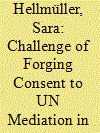

|
|
|
|
|
| Summary/Abstract |
This article analyzes how the internationalization of civil wars influences conflict parties’ consent to UN mediation processes. Illustrated by the UN mediation in Syria, I argue that internationalization influences consent directly by obstructing the advent of a costly stalemate and the parties’ perception of mediation as a ‘way out,’ and indirectly by reducing mediators’ leverage and perceived impartiality thereby limiting their tools to foster consent. The article makes three contributions. First, it presents a novel conceptual framework to understand the impact of internationalization on conflict parties’ consent. Second, it provides a long-term analysis of UN mediation in Syria from 2012–2020. Third, it contributes to a broader discussion about how civil wars end. This is of particular relevance as the prioritization of a political over a military end to civil wars, which was dominant in the early post-Cold War period, is no longer unquestioned.
|
|
|
|
|
|
|
|
|
|
|
|
|
|
|
|
| 2 |
ID:
183954
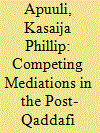

|
|
|
|
|
| Summary/Abstract |
Since the end of the revolution that toppled the rule of Muammar Qaddafi in October 2011, Libya has never known peace. The country descended into civil war with different factions contending for control. In this milieu, the United Nations attempted to mediate an end to the crisis but its efforts have failed to gain traction partly as a result of other mediation initiatives undertaken by several European actors. Sub-regional and continental organizations, including the Arab Maghreb Union (AMU) and the African Union (AU) respectively, that should have taken the lead in the mediation have been absent. Meanwhile, continued fighting has hampered a mediated settlement, and terrorist groups such as the Islamic State (IS) and al-Qaeda have taken advantage of the situation to establish a presence in the country. In the end, rather than ending the crisis, Libya has provided the ground for competing mediation processes which have prolonged the crisis.
|
|
|
|
|
|
|
|
|
|
|
|
|
|
|
|
| 3 |
ID:
183958
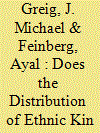

|
|
|
|
|
| Summary/Abstract |
The literature on ethnic kin-groups primarily focuses on their role in perpetuating conflict. Less attention has been devoted to how ethnic kin-groups might encourage mediation in disputes affecting their kin in other nations. We argue that transborder kin-groups’ collective concern for the welfare of their fellow members in other states can motivate interstate mediation efforts. Utilizing the Ethnic Power Relations and the Issue Correlates of War datasets, we examine how transborder kin-group connections shape the likelihood of mediation, as well as who provides it. Our findings suggest that the deeper the network of transborder kin-group connections among target states of territorial disputes, the more likely mediation is to occur. Alternatively, challenger transborder kin-group connections reduce the likelihood of mediation. While transborder kin-group connections help explain the likelihood of mediation, mediation is often not provided by the connected third-party state. Instead, these connections promote mediation from international organizations, particularly regional organizations.
|
|
|
|
|
|
|
|
|
|
|
|
|
|
|
|
| 4 |
ID:
183953
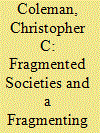

|
|
|
|
|
| Summary/Abstract |
The cases of peacemaking in Kosovo and Sudan/South Sudan yield insights into the interplay of international politics, relations among political elites, and reconciliation among identity groups. A durable, positive peace requires an approach by peacemakers that encompasses all these dimensions. Complicating matters, the readiness of states to adhere to rules and norms built up over decades has declined in recent years. Absent a concerted effort to (re)build them, the work of peace mediation will become more challenging and the odds of success incalculably longer. This, in turn, will corrode the ability of external powers, competing via proxy, to work together even on unrelated matters in different parts of the globe.
|
|
|
|
|
|
|
|
|
|
|
|
|
|
|
|
| 5 |
ID:
183952


|
|
|
|
|
| Summary/Abstract |
This thematic issue explores the past, present, and future of UN mediation. Based on in-depth case studies of UN mediation in some of the most intractable contemporary armed conflicts, it shows the challenges related to lacking consensus amongst third parties, disunity in the UN Security Council, and the internationalization of conflicts. At the same time, it highlights the UN’s legitimacy, expertise, and convening power, and its importance in the context of broader international dispute management systems. It also underlines the need to rethink how we measure success of UN mediation efforts and to reflect on the consequences of increasing normative plurality in world politics. Finally, this issue points to some areas for future research, including more critical mediation theory, reflections about the worldviews underlying UN mediation, and innovative approaches related to the UN reform agenda.
|
|
|
|
|
|
|
|
|
|
|
|
|
|
|
|
| 6 |
ID:
183955
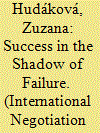

|
|
|
|
|
| Summary/Abstract |
Over the past few years, Yemen has become synonymous with mediation failure. This contrasts sharply with the situation in the early 2010s, when the United Nations played a crucial role in persuading Yemen’s long-serving President, Ali Abdullah Saleh, to step down from power and, at least initially, successfully steered the country during the ensuing political transition. By analyzing UN mediation efforts during the mandate of Special Adviser Jamal Benomar, the article draws attention to the multiple shifting benchmarks for success. It adopts a phase-differentiated approach to mediation evaluation, which not only allows for recognition of earlier successes, but also enables an analysis of relevant factors influencing mediation success or failure in different stages of the mediation process. In the final instance, the analysis suggests that the eventual failure of UN mediation in Yemen can be traced to conflict and contextual factors rather than the mediator or the mediation process.
|
|
|
|
|
|
|
|
|
|
|
|
|
|
|
|
| 7 |
ID:
183957
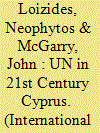

|
|
|
|
|
| Summary/Abstract |
For decades, the UN has failed to mediate a settlement in Cyprus because of a general and profound weakness: it is unable, outside of unity and resolve in the Security Council, to offer direct incentives to parties in conflict that would shape their calculus towards conflict resolution, or to control the actions of third parties in a way that would incentivize conflict resolution or prevent disincentives. In the resulting vacuum, the prospects for peace settlements come to rest largely on domestic politics within the contesting camps and, sometimes relatedly, on the balance of power between them. In the case of Cyprus, the article claims that these weaknesses on the part of the UN were clearly on display during the negotiation process surrounding the Annan Plan (2001–04) and the resumed process that began in 2008 and ended at Crans-Montana in 2017.
|
|
|
|
|
|
|
|
|
|
|
|
|
|
|
|
|
|
|
|
|